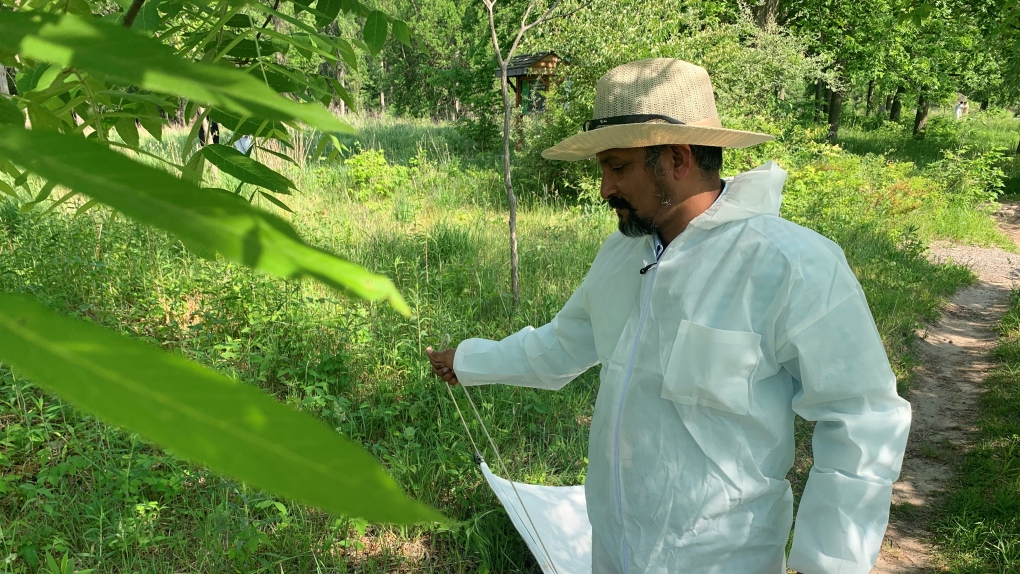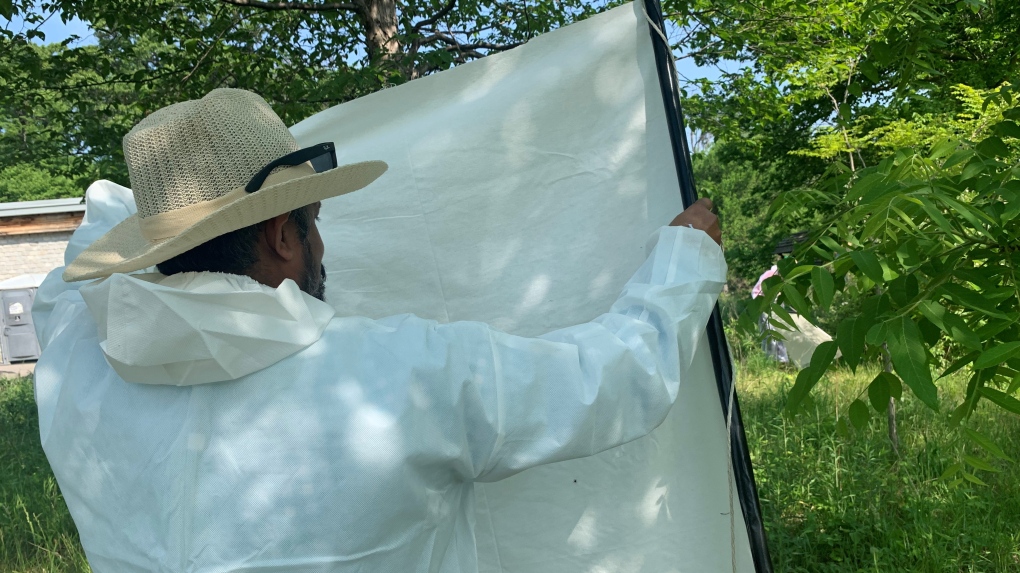Active tick surveillance begins in Windsor-Essex
The Windsor-Essex County Health Unit (WECHU) launched their active tick surveillance Friday with some tips on how to prevent tick bites.
The WECHU’s tick surveillance includes the identification and testing of ticks that are collected by public health staff. Public parks and trails frequently used by residents are surveyed to gather local data of tick populations.
"They are small insects very similar to the spider family,” said health promotion specialist Amandeep Hans. “We have two varieties here — dog ticks and deer ticks.”
These ticks are very small and hard to see, WECHU officials say, some as small as a poppy seed. They are often fund in wooded areas like campgrounds, parks, trils and even your own backyard.
"The blacklegged ticks are the ones we are looking for,” Hans said. “They are the ones that cause Lyme disease.”
"If the tick has been attached for more than 24 hours the symptoms can last anywhere from three days to one month.”
Some symptoms include a rash, fever, chills, headache, muscle pain and fatigue.
The region has been deemed an "endemic area" for ticks.
Hans said part of the reason for the uptick in ticks this year comes down to climate change.
"It's climate change,” she said. “We have increased temperatures, rainfall, (humidity).
 The Windsor-Essex County Health Unit launched their active tick surveillance program in Windsor, Ont. on Friday, June 2, 2023. (Stefanie Masotti/CTV News Windsor)
The Windsor-Essex County Health Unit launched their active tick surveillance program in Windsor, Ont. on Friday, June 2, 2023. (Stefanie Masotti/CTV News Windsor)
WECHU offers the following tips to help avoid tick bites:
- Avoid walking in tall grass and stay on the centre of paths
- Cover up. Wear pants and long-sleeved shirts
- Wear light coloured clothing to spot ticks easily
- Tuck your pants into your socks and wear closed toed shoes
- Do a full body check on yourself, children and pets after being outdoors
- Shower within two hours of being outdoors
- Put your clothes into a dryer on high heat (at least 60 minutes) to kill any possible ticks
- Put a tick collar on your pets
- Keep grass in your yard short
 The Windsor-Essex County Health Unit launched their active tick surveillance program in Windsor, Ont. on Friday, June 2, 2023. (Stefanie Masotti/CTV News Windsor)
The Windsor-Essex County Health Unit launched their active tick surveillance program in Windsor, Ont. on Friday, June 2, 2023. (Stefanie Masotti/CTV News Windsor)
WECHU advises if you do find a tick on your body, quickly remove it with a tick key or a pair of tweezers. Gently wash the bite and surrounding area with soap and water or rubbing alcohol.
If you are concerned about the possibility of Lyme disease, which certain ticks carry, the health unit says to take the following steps:
- Do not dispose of the tick
- Keep it in a container or a small plastic bag that can be sealed
- Place a piece of damp paper towel in the container or the bag
- Contact your health care provider and discuss if any further action is required
The WECHU no longer accepts ticks for identification and testing. Instead, a free online service for identification is available, you can submit a photograph of the tick to etick.ca.
For background information including statistics, visit WECHU's Ticks and Lyme disease web page.
-- With files from CTV News Windsor's Stefanie Masotti
 The Windsor-Essex County Health Unit launched their active tick surveillance program in Windsor, Ont. on Friday, June 2, 2023. (Stefanie Masotti/CTV News Windsor)
The Windsor-Essex County Health Unit launched their active tick surveillance program in Windsor, Ont. on Friday, June 2, 2023. (Stefanie Masotti/CTV News Windsor)
CTVNews.ca Top Stories

MPP Sarah Jama asked to leave Ontario legislature for wearing keffiyeh
MPP Sarah Jama was asked to leave the Legislative Assembly of Ontario by House Speaker Ted Arnott on Thursday for wearing a keffiyeh, a garment which has been banned at Queen’s Park.
2 teens charged in Halifax homicide: police
Two teenagers have been charged with second-degree murder in connection to an alleged homicide near the Halifax Shopping Centre earlier this week.
'Deep ignorance': Calls for Manitoba trustee to resign sparked after comments about Indigenous people and reconciliation
A rural Manitoba school trustee is facing calls to resign over comments he made about Indigenous people and residential schools earlier this week.
Humanist group threatening to sue Vancouver over council prayers
The B.C. Humanist Association has threatened legal action against the City of Vancouver for allowing prayers at council, following a similar warning issued earlier this month to a smaller community on Vancouver Island.
Legendary hockey broadcaster Bob Cole dies at 90: CBC
Bob Cole, a welcome voice for Canadian hockey fans for a half-century, has died at the age of 90. Cole died Wednesday night in St. John's, N.L., surrounded by his family, his daughter, Megan Cole, told the CBC.
Here's why Harvey Weinstein's New York rape conviction was tossed and what happens next
Here's what you need to know about why movie mogul Harvey Weinstein's rape conviction was thrown out and what happens next.
12-year-old hippo in Japan raised as a male discovered to be a female
When Gen-chan arrived at a zoo in Japan in 2017, no one questioned whether the then-five-year-old hippopotamus was a boy. Seven years later, zoo staff made a surprising discovery: Gen-chan, now 12, was female.
Mountain guide dies after falling into a crevasse in Banff National Park
A man who fell into a crevasse while leading a backcountry ski group deep in the Canadian Rockies has died.
LHSC performs a Canadian first in robot-assisted direct lateral spine surgery
Spine surgery may never be the same for people with chronic back pain and other physical ailments.































